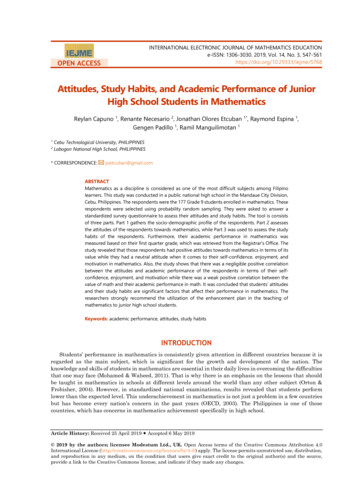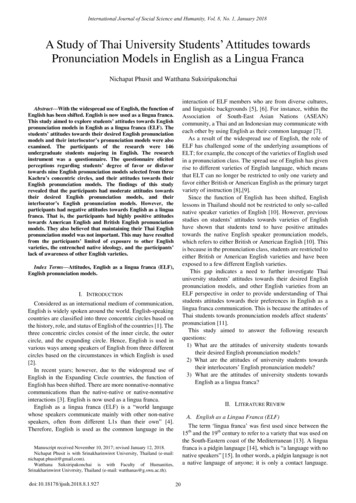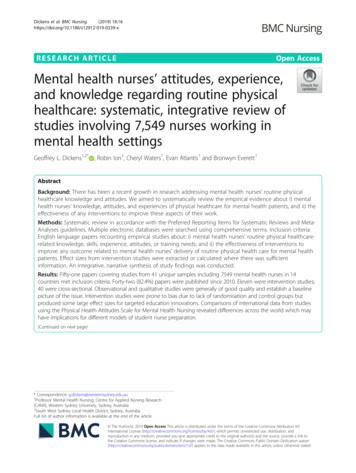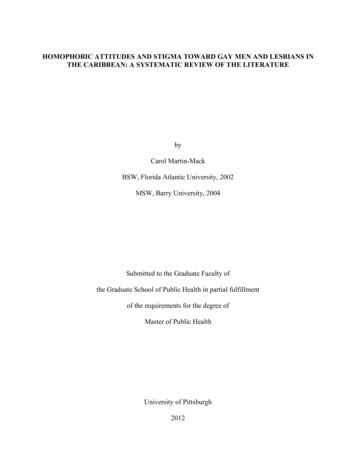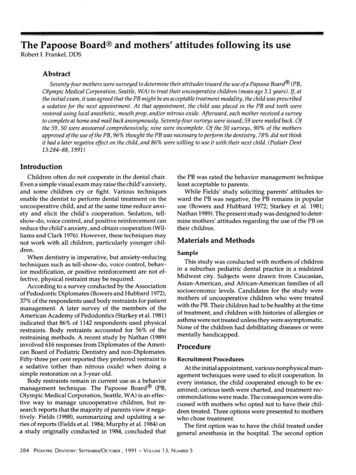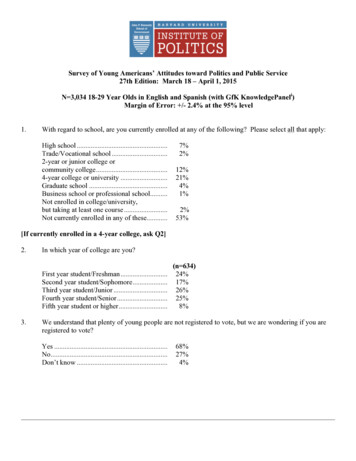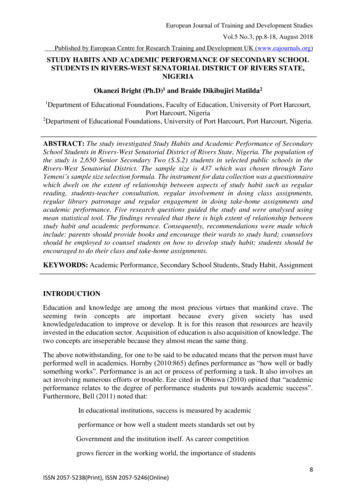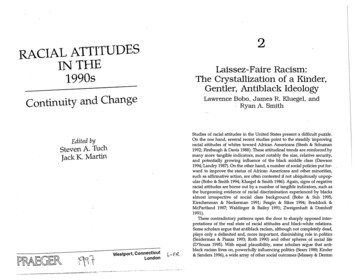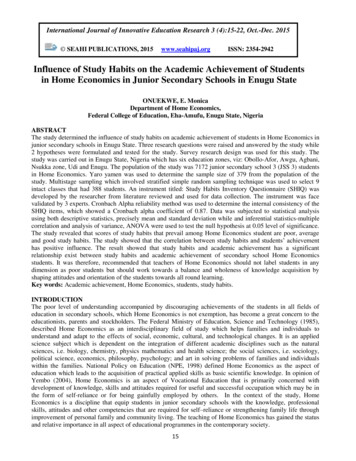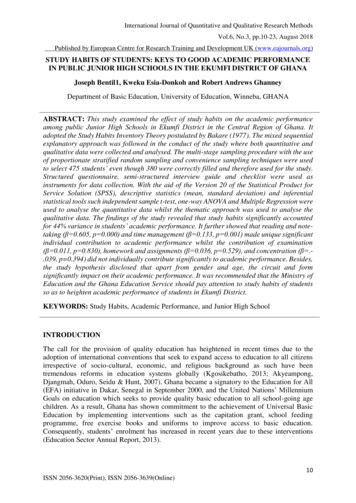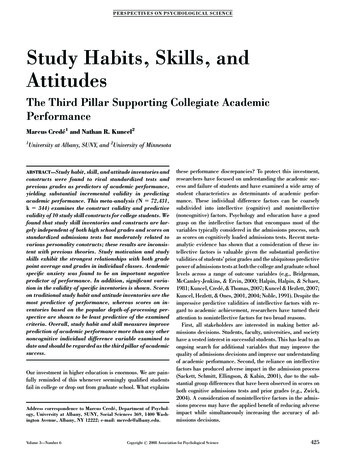
Transcription
P ERS PE CT IVE S ON PS YC HOLOGIC AL SC IENC EStudy Habits, Skills, andAttitudesThe Third Pillar Supporting Collegiate AcademicPerformanceMarcus Credé1 and Nathan R. Kuncel21University at Albany, SUNY, and 2University of MinnesotaABSTRACT—Study habit, skill, and attitude inventories andconstructs were found to rival standardized tests andprevious grades as predictors of academic performance,yielding substantial incremental validity in predictingacademic performance. This meta-analysis (N 5 72,431,k 5 344) examines the construct validity and predictivevalidity of 10 study skill constructs for college students. Wefound that study skill inventories and constructs are largely independent of both high school grades and scores onstandardized admissions tests but moderately related tovarious personality constructs; these results are inconsistent with previous theories. Study motivation and studyskills exhibit the strongest relationships with both gradepoint average and grades in individual classes. Academicspecific anxiety was found to be an important negativepredictor of performance. In addition, significant variation in the validity of specific inventories is shown. Scoreson traditional study habit and attitude inventories are themost predictive of performance, whereas scores on inventories based on the popular depth-of-processing perspective are shown to be least predictive of the examinedcriteria. Overall, study habit and skill measures improveprediction of academic performance more than any othernoncognitive individual difference variable examined todate and should be regarded as the third pillar of academicsuccess.Our investment in higher education is enormous. We are painfully reminded of this whenever seemingly qualified studentsfail in college or drop out from graduate school. What explainsAddress correspondence to Marcus Credé, Department of Psychology, University at Albany, SUNY, Social Sciences 369, 1400 Washington Avenue, Albany, NY 12222; e-mail: mcrede@albany.edu.Volume 3—Number 6these performance discrepancies? To protect this investment,researchers have focused on understanding the academic success and failure of students and have examined a wide array ofstudent characteristics as determinants of academic performance. These individual difference factors can be coarselysubdivided into intellective (cognitive) and nonintellective(noncognitive) factors. Psychology and education have a goodgrasp on the intellective factors that encompass most of thevariables typically considered in the admissions process, suchas scores on cognitively loaded admissions tests. Recent metaanalytic evidence has shown that a consideration of these intellective factors is valuable given the substantial predictivevalidities of students’ prior grades and the ubiquitous predictivepower of admissions tests at both the college and graduate schoollevels across a range of outcome variables (e.g., Bridgeman,McCamley-Jenkins, & Ervin, 2000; Halpin, Halpin, & Schaer,1981; Kuncel, Credé, & Thomas, 2007; Kuncel & Hezlett, 2007;Kuncel, Hezlett, & Ones, 2001, 2004; Noble, 1991). Despite theimpressive predictive validities of intellective factors with regard to academic achievement, researchers have turned theirattention to nonintellective factors for two broad reasons.First, all stakeholders are interested in making better admissions decisions. Students, faculty, universities, and societyhave a vested interest in successful students. This has lead to anongoing search for additional variables that may improve thequality of admissions decisions and improve our understandingof academic performance. Second, the reliance on intellectivefactors has produced adverse impact in the admission process(Sackett, Schmitt, Ellingson, & Kabin, 2001), due to the substantial group differences that have been observed in scores onboth cognitive admissions tests and prior grades (e.g., Zwick,2004). A consideration of nonintellective factors in the admissions process may have the applied benefit of reducing adverseimpact while simultaneously increasing the accuracy of admissions decisions.Copyright r 2008 Association for Psychological Science425
Study Habits Meta-AnalysisThe evidence regarding the validity of scores on inventories ofnonintellective factors, however, has often been underwhelming. Observed relationships between personality and academicachievement have typically been low (e.g., Ridgell & Lounsbury,2004; Thomas, Kuncel, & Credé, 2007; Zagar, Arbit, & Wengel,1982). Not surprisingly, only specific aspects of temperamentare relevant in academic situations, as is the case in worksettings (e.g., conscientiousness, Duff, Boyle, Dunleavy, &Ferguson, 2004; Lievens, Coetsier, De Fruyt, & De Maeseneer,2002), and these relationships are markedly smaller than thoseobtained from tests and prior grades. Recent work has shownmore promising levels of validity for scores on biographicalinventories and situational judgment tests (Oswald, Schmitt,Kim, Ramsay, & Gillespie, 2004), as well as for a variety ofpsycho-social variables including academic motivation,achievement motivation, and academic self-efficacy (Robbins etal., 2004). However, some of these factors are also likely to beassociated with opportunity and social class, and some are notreadily modifiable through intervention.Another promising group of highly academically focusedfactors relate specifically to the studying and learning behaviorsof students. The empirical and theoretical literature relating tothese constructs is very large and very fragmented, described bya wide variety of proposed constructs, and operationalized by anarray of inventories. Proposed constructs include study skills(e.g., Aaron & Skakun, 1999), study habits (e.g., Murray &Wren, 2003), study attitudes (e.g., W.S. Zimmerman, Parks,Gray, & Michael, 1977), study motivation (e.g., Melancon,2002), meta-cognitive skills (e.g., Zeegers, 2001), study anxiety(e.g., Miller & Michael, 1972), and depth of processing (e.g.,C.W. Hall, 2001). Frequently used inventories of these constructs are comparably numerous and include the Survey ofStudy Habits and Attitudes (SSHA; W.F. Brown & Holtzman,1967), Learning and Study Skills Inventory (LASSI; Weinstein,& Palmer, 2002), Inventory of Learning Processes (Schmeck,Geisler-Brenstein, & Cercy, 1991), and the Study ProcessQuestionnaire (Biggs, 1987).However, ‘‘promising’’ does not mean ‘‘proven.’’ Assessmentand training are not free, and study habits, skills, and attitudes(SHSAs) would need more than strong correlations with subsequent performance to be powerful predictors—they would alsoneed to add considerable unique information to the existingmeasures to warrant their use. Despite the considerable research attention focused on these various constructs, these issues have not been resolved, and the precise nature of theconstructs’ relationship to academic performance is not wellunderstood. The combination of construct proliferation andmixed findings in the literature has lead to this state. The development of a taxonomy combined with a meta-analytic reviewwill likely provide clarity and condense the extensive butfragmented empirical literature and the variety of theoreticaland empirical approaches. We anticipate both practical andtheoretical benefits.426At a practical level, we anticipate benefits for the admissionsprocess, college counseling programs, and for the measurementof SHSAs. We do not believe that self-reports of study behaviorsas currently measured are likely to be particularly useful in anadmissions context given the susceptibility of such inventoriesto faking and socially desirable responding.1 Rather, we anticipate that ratings of SHSA constructs would be more useful whenprovided by high school counselors, principals, or teachers,particularly if these ratings are made using psychometricallysound rating forms.In addition, capturing accurate SHSA information aboutcollege applicants in a low-stakes development context wouldallow admissions officers to better identify students who wouldbe able to succeed in college and would allow college counselorsto better anticipate the academic difficulties of at-risk students(e.g., students with sound admissions test scores but poor studyhabits). Meta-analytic results illustrating meaningful relationships between SHSA constructs and academic performance mayact as a spur for the development and use of such rating forms. Itis also important to note that a meta-analytic review will directlybenefit training and counseling programs that focus on providingstudents with better SHSAs by highlighting constructs andprocesses that are most strongly related to performance in college. Programs that focus on the acquisition of specific studyskills are likely to be particularly useful in light of the consistentfinding that the amount of studying (time spent studying) islargely unrelated to academic performance (e.g., Mael, Morath,& McLellan, 1997; Schuman, Walsh, Olson, & Etheridge, 1985).Improving study-skill training interventions appears to be particularly important given meta-analytic evidence that the impactof study-skill training interventions on both reported studypractices and performance is strongly moderated by the type ofstudy skill training (Hattie, Biggs, & Purdie, 1996).Identifying SHSA constructs that are most strongly related toacademic performance should assist in both identifying ineffective training methods and in identifying what the focus oftraining programs should be. Those that are most strongly related to academic performance may, all else being equal, be ofthe highest utility as candidates for training. A final practicalbenefit is that a meta-analytic review will also likely establishwhether or not scores on different inventories of SHSA constructs are differentially valid with regard to college performance. This would allow researchers and practitioners in theSHSA domain to make informed decisions regarding the appropriateness of different inventories and may also providemotivation for the refinement of existing inventories.1However, the current state of research on detection and control of faking onpersonality and related tests is as promising as it has ever been with the recentdevelopment of a variety of promising methods (Bagby et al., 1997; Eid &Zickar, 2007; Kuncel & Borneman, 2007). Proven versions of these methodsmay be operational soon. What will remain to be seen is if they can resist theinevitable flood of coaching methods that follow high-stakes testing.Volume 3—Number 6
Marcus Credé and Nathan R. KuncelA better understanding of how SHSA constructs relate toacademic performance will also facilitate a better theoreticalunderstanding of how various individual difference factors arerelated to academic performance. The predictive power of scoreson cognitive instruments such as the SAT or GRE have a gooddeal of utility in the selection process, but these scores on theirown do not provide us with a full understanding of why successor failure occurs (e.g., McCall, 1994; Romine & Crowell, 1981).SHSA constructs can provide us with a better understandingof these phenomena, especially if we consider that, by someaccounts, many freshmen college students do not possess therepertoire of study skills and study habits necessary to effectively cope with the academic requirement of colleges (e.g.,Bishop, Bauer, & Becker, 1998; Hechinger, 1982; Sanoff, 2006)or to prepare effectively for high stakes testing situations (e.g.,Loken, Radlinksi, Crespi, Millet, & Cushing, 2004).Specifically, measures of cognitive ability provide an indication of whether a student has the ability to learn and understand complex material, but they do not indicate whether thestudent has acquired the patterns of studying behavior that arenecessary to process, integrate, and recall such material.Different SHSA constructs can provide information aboutwhether this is a matter of attitudes toward studying (e.g., ‘‘I feelthat it is not worth the time, money, and effort that one mustspend to get a college education’’), actual study behaviors (e.g.,‘‘I stop periodically while reading and mentally go over or reviewwhat was said’’), or the cognitive processes engaged in by students while studying (e.g., ‘‘I make connections among thedifferent ideas or topics I am studying in my courses’’). A betterunderstanding of the potentially different relationships amongSHSA constructs and academic performance can be attainedby considering the dimensionality of SHSAs and how theseconstructs fit into existing theoretical frameworks of performance in general and of college performance in particular.THEORIES AND MEASURES OF STUDY BEHAVIORSThe Dimensionality of SHSAsThe research literature on SHSAs dates back over 65 years (e.g.,Hartson, Johnson, & Manson, 1942; L. Jones & Ruch, 1928;Locke, 1940), but substantial disagreement remains as to thedimensionality and structure of SHSAs. This lack of agreementappears to be largely a function of the differing ways in whichoperationalizations of SHSAs have been developed. Althoughsome researchers have adopted a strictly empirical approachwhereby items that optimally distinguish between over- andunderachievers are factor analyzed to generate constructs (e.g.,W.F. Brown & Holtzman, 1955), others have based inventorieson theoretical considerations (e.g., Entwistle, Thompson, &Wilson, 1974) or on qualitative analyses of the verbalizedstrategies used by students when studying (e.g., Marton,Hounsell, & Entwistle, 1984; Pressley & Afflerbach, 1995). Inall, scales and research in this domain tend to focus on one ofVolume 3—Number 6three broad areas: SHSAs themselves, the depth at which information is processed while studying, and the metacognitiveawareness of the studying student.Study Skills, Study Habits, and Study AttitudesAs typically used in the broader literature, study skills refers tothe student’s knowledge of appropriate study strategies andmethods and the ability to
Study Habits and Attitudes (SSHA; W.F. Brown & Holtzman, 1967), Learning and Study Skills Inventory (LASSI; Weinstein, & Palmer, 2002), Inventory of Learning Processes (Schmeck, Geisler-Brenstein, & Cercy, 1991), and the Study Process Questionnaire (Biggs, 1987). However, ‘‘promising’’ does not mean ‘‘proven.’’ Assessment and training are not free, and study habits, skills, and .
